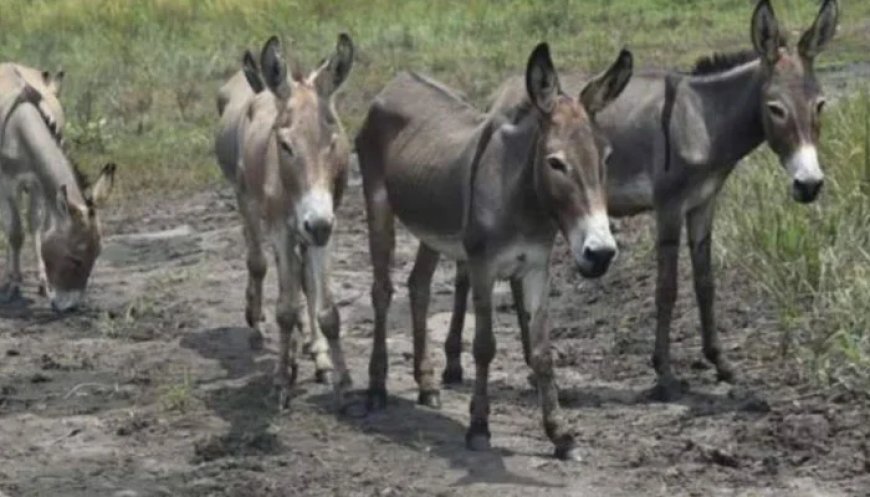Pakistan’s maiden donkey slaughterhouse begins production in Gwadar

1. With China being major market, Pakistan's donkey population stands at approximately 5.9 million
For the first time in Pakistan's history, a newly established slaughterhouse in Gwadar has begun production to meet the growing demand for donkey meat, bones, and hides in China, where they are used to manufacture e-jiao, a traditional medicinal product. The Ministry of National Food Security and Research (MNFSR) confirmed this development on Thursday.
During a meeting of the National Assembly Standing Committee on Food Security, chaired by Rana Muhammad Hayat, officials revealed that China has signed an agreement with Pakistan for the procurement of donkey hides and bones. A Chinese company has already started operations in Gwadar, marking a significant step in this unconventional export sector.
When Hayat asked why Pakistan wasn't exporting live donkeys, officials explained that the logistics involved in exporting live animals were more challenging and less economically viable compared to exporting their by-products.
The MNFSR also noted that there have been numerous requests to establish donkey slaughterhouses in other parts of the country, and discussions are ongoing with other Chinese companies interested in investing in this trade.
Hayat also pointed out that donkeys, once essential for small-load transport, were increasingly becoming irrelevant as beasts of burden, leading to a decline in their domestic use. He suggested that Pakistan should focus on selective breeding of high-quality donkeys to maintain their population, recognizing their potential economic value.
Pakistan's donkey population is approximately 5.9 million, with China being a major market for donkey meat and hides. The hides are used to produce e-jiao, a traditional gelatin-based medicine.
Exports had been limited in the past due to delays in finalizing protocols, but these issues have now been resolved.
Animal welfare groups and veterinary experts have raised concerns, with reports stating that China's demand for e-jiao is driving the slaughter of millions of donkeys every year.
What is e-jiao and why do Chinese elites love it?
E-jiao, made from collagen extracted from donkey hides, is an important ingredient in food and beauty products. Many Chinese consumers believe it helps enrich blood, boost the immune system, and prevent diseases. Historically, e-jiao became popular among China's elite during the Qing dynasty (1644-1912), and its demand has surged in recent years, fueled in part by the Chinese television series Empress in the Palace, which began airing in 2011. China's growing middle class and aging population have also contributed to this rise in demand.
The price of e-jiao has increased dramatically over the past decade, rising from 100 yuan per 500 grams to 2,986 yuan ($420), according to Chinese state media.
E-jiao Industry Needs 5.9 Million Donkeys Annually
The e-jiao industry requires around 5.9 million donkey skins annually, creating significant pressure on global donkey populations, according to a February report by The Donkey Sanctuary, a UK-based charity. E-jiao production has a 3,000-year history in the northern Shandong province of China, which accounts for around 90% of the country's e-jiao output. The product is considered a “national cultural heritage” and is vital to China's traditional medicine industry.
Four companies dominate the e-jiao sector in China: Dong-E-E-Jiao controls about 60% of the market, followed by the Fu brand with 15%, and Taiji and Tongrentang Ejiao with 10% each.
What Happened to China’s Donkeys?
China's donkey population has plummeted by more than 80% from 11 million in 1992 to just under 2 million today. This dramatic decline has led the e-jiao industry to seek donkey hides from abroad, including from countries like Pakistan and Afghanistan.
Reports indicate that most donkey skins exported from Pakistan to China are part of an underground trade. For example, in 2022, a shipment in Karachi containing nearly 10 metric tons of donkey hides was seized. The shipment had been falsely declared as containing salt and handkerchiefs.
Donkeys reproduce much more slowly than other livestock, such as pigs and cows. Female donkeys, known as Jennies, are pregnant for about 11-14.5 months and typically give birth to just one foal at a time. Experts say that establishing a farming system capable of producing the 5.9 million donkey skins needed annually for e-jiao could take more than 20 years.


















































